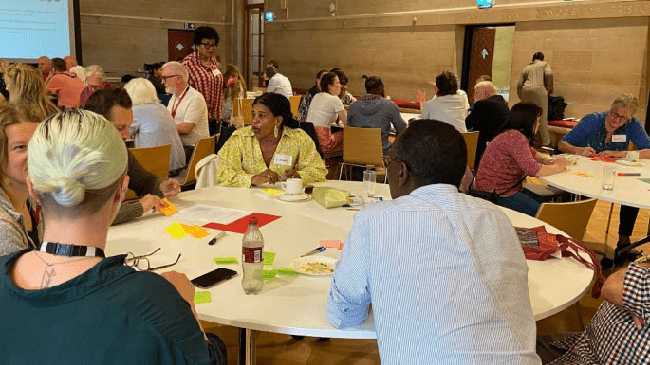Goal 16: Peace, justice and strong institutions
Promote peaceful and inclusive societies for sustainable development, provide access to justice for all and build effective, accountable and inclusive institutions at all levels
Our research
A report, led by an academic in the School for Policy Studies, has uncovered the many risks of participating in climate and environmental protests across the world. It is the first report to examine global statistics on this form of protest and has identified alarming trends. It reveals that more than 2,000 climate and environmental protesters have been killed over the past 12 years and that a raft of new anti-protest legislation has been enacted, with more countries criminalising and repressing this activity in a bid to keep it in check. The report calls for governments, police forces and the legal system to help protect people’s right to peaceful assembly and freedom of expression.
Trust remains a key issue in the policing of violence against women and girls (VAWG) in Black and minoritised communities, and this type of crime is much less likely to result in offenders being charged compared to other offences. A report outlining these issues, led by the University of Bristol, is based on feedback from police officers, filmed operational responses to VAWG call-outs, and incident case files. It was published as the United Nations (UN) Women 16 days of activism against gender-based violence campaign drew to a close in December 2024. The findings follow two recent major policing reports which highlighted institutional racism and systematic failures in safeguarding women and girls from violence.
Our students
Colleagues across the universities of Bristol, Bath, Cardiff and Exeter teamed up in 2024 to form the Climate Justice Education Research Network (CJERN). The activities of the network involved bringing together a core group of researchers from across the four universities, known as GW4, to explore potential collaborations in the field of climate justice education. Environmental education research is often framed as a purely scientific issue, which does not consider the unequal societal impacts of the climate and ecological emergencies. The project aims to develop new justice-focused educational responses through a series of workshops and activities.
Students and staff from the School of Sociology, Politics and International Studies have spent two years working with Bristol City Council on a vital community development project. The University evaluated the Community Resilience Fund, a £4 million capital grant to refurbish community buildings and other assets in the city’s most in-need areas. It was designed to support community and voluntary organisations to recover from the pandemic, increase their sustainability and continue the important work they do in the long-term. The fund used a deliberative democratic approach to allocate the funding, bringing together councillors and residents to decide which proposals would receive support.

Our communities
Reparative Futures is a £10 million programme which aims, through a series of targeted initiatives, to redress some of the systemic injustices arising from the transatlantic trafficking of enslaved African people. The University acknowledges its historical ties with individuals linked to that activity and the significant work required to address this legacy. In May 2024, we appointed 24 community Accountability Partners, to provide a link between the University and the wider community of African descent, and hold the University to account for its ambition to create transformational change through reparatory justice work.
A professor in the Law School’s has been appointed to a World Health Organization (WHO) technical advisory group on embedding ethics in health and climate change policy. The WHO is committed to working with Member States, UN and other international agencies and the wider global health and research community to deliver a range of supporting tools and materials to help navigate ethical issues across the health and climate change fields and embed them effectively in relevant policies. Professor John Coggon is one of thirteen members of the new advisory group who will serve to represent the broad range of disciplines relevant to ethics and climate change and health.
Ourselves
In September 2023, the Centre for Environmental Law and Sustainability (CELS) was launched. Based in the Law School, CELS is a centre of excellence for critical scholarship, teaching and public engagement with environmental law and sustainability research, addressing issues across domestic, EU and international jurisdictions. It aims to facilitate collaborations with academics and non-academic partners. Research activity includes fields of new technologies, conservation law, renewable energy, corporate governance and environment, labour law and the environment, and sustainable governance of the commons.
The General Election in July 2024 provided an opportunity for the University’s Special Collections to add to one of their archives. With over 30,000 pieces of political promotional material from every British general election dating back to 1892, it is the UK’s largest archive of political material and has been maintained by the University since the 1970s. Members of the public were invited to donate election-related leaflets they received rather than throwing them away after the election. This forms the basis of a fascinating collection of campaign materials. which are available for research and offer an insight into Britain’s political history.
